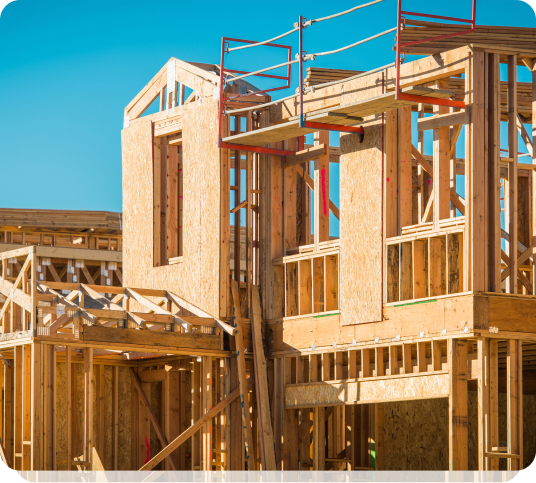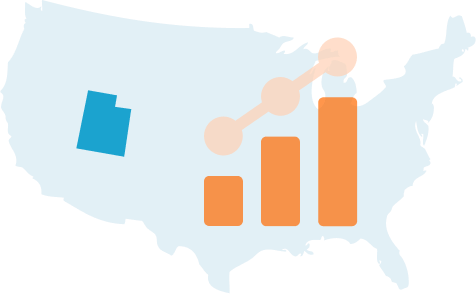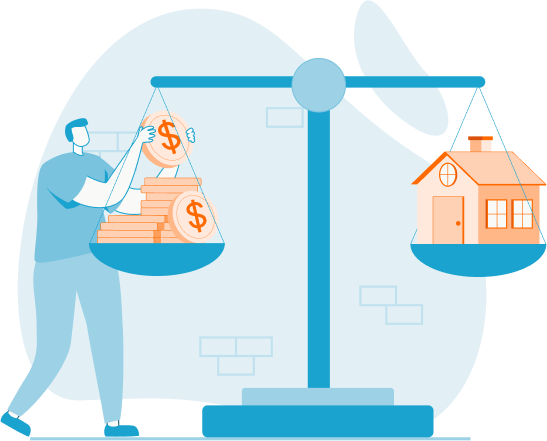Utah New Home Construction Loans & Rates
Our salaried loan officers = Lower costs for you. So splurge on your home, not your mortgage!
- No personal information required
- No upfront deposit for appraisal or credit report required
- Expect to save money

Building a new home can be an exciting experience, but deciding to obtain a new construction loan to build a home can be even more rewarding.
New construction home loans allow you to have more control over your home and ensure it includes the features and materials you desire. While newly constructed homes allow people to make their dreams for their homes a reality, it can be more difficult to qualify for a new home construction loan. Here is a comprehensive guide to new home construction loans in Utah from City Creek Mortgage.

New Home Construction Trends in the U.S. and Utah
The U.S. and Utah housing markets also exhibit a downward trend in new home construction. In September 2023, the U.S. Department of Housing and Urban Development (HUD) and the U.S. Census Bureau reported that 1,473,000 building permits were issued nationwide to build new private housing units. This was a year-over-year decrease of 7.2% from the 1,580,000 building permits for private homes issued in September 2022 and a decrease of 4.4% from the 1,541,000 issued in August 2023.
In Utah, the Federal Reserve reports that 1,957 new building permits were issued for private homes in September 2023 as compared to 2,232 building permits issued in September 2022. This was a 12.3% year-over-year decrease in new building permits for private homes in Utah.
The decline in new home construction can be attributed to market vagaries and economic changes, including rising interest rates and inflation. However, many people still choose to have homes built instead of purchasing existing homes. Many people finance them with new home construction loans.
How New Home Construction Loans Differ From Traditional Mortgages
New home construction loans differ from traditional mortgages because they are not secured by an already existing home. Because of this, they are viewed as riskier than traditional mortgages by lenders. To account for the additional risk, lenders often have stricter qualifying requirements for new home construction loans vs. traditional mortgages. Why are they risker? Let’s explore the top 5 reasons:
- Lack of Collateral: New home construction loans don’t have any existing property to act as collateral, this increases the risk if (you) the borrower defaults.
- Construction Risk: The construction process is fraught with potential delays and cost overruns, making loan outcomes a gray area.
- Market Value Variability: The future value of your dream home is unpredictable, this can potentially result in the property being worth less than the loan amount.
- An Incompleted Project: Unforeseen financial variables during construction can lead to incomplete projects, reducing the property’s saleability and value.
- Regulatory and Permitting Issues: Changes in building regulations and permit requirements can delay or disrupt construction, adding risk for your lender.
New home construction loans are also short-term loans that only finance the construction phase. Depending on your loan type, you will either need to get a traditional mortgage at the end of the construction loan or get a construction loan that converts to a mortgage. However, if you want to have a home built and finance it with a new home construction loan, you have several options.

City Creek Mortgage’s Offerings
New home construction loans typically fall into three main categories, including the following:
- Construction-only loans – These are short-term loans that have a duration ranging from six months up to 18 months for the construction phase. Once the home is completed, you’ll either need to make a balloon payment to pay the loan off or secure a traditional mortgage to pay for the construction loan and finance your home. With a construction-only loan, you’ll have to pay closing costs for the construction loan and again when you get a mortgage at the end of the project. This means you could end up paying thousands of dollars more in closing costs. Your economic circumstances could also change during the interim, making it hard to qualify for a traditional mortgage when the construction loan is over.
- Construction-to-permanent loans – Construction-to-permanent loans are a second option. These loans convert to permanent mortgages once the construction phase ends. During construction, the borrower makes interest-only payments. Upon completion, the loan then converts to a traditional mortgage with a loan term that typically ranges from 15 to 30 years. At that time, the borrower’s payments will include both principal and interest until the mortgage is fully repaid.
- Home renovation loans – In some cases, people want to buy existing homes but finance extensive renovations with their mortgage loans. This type of construction loan is called a renovation mortgage, and there are a few types. The Federal Housing Administration (FHA) offers 203(k) renovation loans, which are government-backed mortgages that allow people to borrow money to finance the purchase plus an additional amount to complete renovations. Conventional mortgage options for renovations include the Freddie Mac CHOICE Renovation program and the Fannie Mae Homestyle Renovation program. If you already own your home but want to make renovations, you could also apply for a cash-out refinance mortgage.
- Owner-builder construction loan – Owner-builder construction loans are construction-only or construction-to-permanent loans in which the homeowner also serves as the general contractor for the construction phase. Lenders typically won’t approve these loans unless the homebuilder is a licensed contractor with substantial and verifiable experience building homes. If you are qualified, an owner-builder loan can save you money on the costs of hiring a general contractor to build your home and manage all aspects of construction.
- End loans – These are mortgages that you can get at the end of your construction loan and might include a conventional mortgage, government-backed mortgage, or jumbo loan.
Since City Creek Mortgage works with many lenders, they can help you find the new home construction loan that best meets your needs. Here’s a look at some of the types of new home construction loans that might be available to you.
 Conventional Construction-to-Permanent Loans
Conventional Construction-to-Permanent Loans
Conventional construction-to-permanent loans are two loans in one product. During the construction phase, the loan will be disbursed according to a draw schedule to pay for different aspects of construction. The interest rate during the construction phase will typically be variable, and you will have to make interest payments. Once your home is built and you move in, your mortgage will then convert to a traditional mortgage. You’ll pay closing costs once when you get the original loan and will not have to pay them again when it converts into a mortgage.
Conventional construction-to-permanent loans are not guaranteed by a government agency. This means that the lender will face more risk because of the potential for default. The loan is also not secured against an already-constructed home during the construction phase, so there are added risks for the lender during that period that something might go wrong.
Because of the additional risks, lenders typically charge higher rates of interest for construction-to-permanent construction loans than for regular mortgages. You’ll typically need to put between 20% to 25% down, have a credit score of at least 680, have a low debt-to-income ratio, and have substantial cash reserves.
Conventional construction-to-permanent loans must also meet the conforming loan limits for the county in which you plan to build your home. These limits are set and adjusted annually by the Federal Housing Finance Agency (FHFA). In 2023, most counties in Utah have conforming loan limits of $766,550. However, there are a few high-cost-of-living areas in Utah with higher conforming loan limits, including:
- Box Elder – Single family conforming loan limit of $766,550
- Davis – Single-family conforming loan limit of $766,550
- Morgan – Single-family conforming loan limit of $766,550
- Summit – Single-family conforming loan limit of $1,149,825
- Wasatch – Single-family conforming loan limit of $1,149,825
- Weber – Single-family conforming loan limit of $766,550
The remaining counties in Utah have conforming loan limits of $726,200 for 2023. The conforming loan limit is the maximum a lender can loan to you to finance a home. For a construction-to-permanent new home construction loan, it is the maximum amount you can finance with a conventional mortgage.
 Construction-to-Permanent Jumbo Loan
Construction-to-Permanent Jumbo Loan
If you plan to have a home built that will exceed the conforming loan limits for your county, you might be able to get a jumbo loan. Jumbo loans are not backed by a federal agency, and Fannie Mae and Freddie Mac will also not buy them from lenders. Because of this, you will have to meet very strict qualifying requirements to get a jumbo loan to build your dream home.
You should anticipate needing a credit score of at least 700 (or 720 from some lenders), significant cash reserves, a low debt-to-income ratio, and a down payment of up to 25% to 30%.
 FHA New Construction Home Loan
FHA New Construction Home Loan
An FHA new construction home loan is a government-backed loan that might be an option. There are two types of FHA construction loans, including a construction-to-permanent FHA mortgage and a 203(k) renovation loan.
FHA Construction-to-Permanent Home Loan
With an FHA construction-to-permanent loan, you can roll in the costs of building the home into your mortgage with a single loan. Since this type of mortgage is backed by the FHA, lenders face less risk than they do with conventional mortgages and thus have less stringent credit qualifying requirements.
The FHA only requires a minimum credit score of 500 to qualify for a mortgage. However, most lenders will require you to have a higher credit score than that. If you do find a lender willing to accept a credit score under 620, your required down payment can vary as follows:
- Credit score of 500 to 579 – Minimum down payment of 10% to 20%
- Credit score of 580 plus – Minimum down payment of 3.5%
The loan amount can’t be more than the FHA loan limits for your county or metropolitan area. The basic FHA mortgage limit in non-metropolitan areas of Utah in 2023 is $472,030. However, multiple metropolitan areas have higher FHA mortgage limits.
You’ll be required to hire a licensed general contractor to build your home and may be required to submit additional documentation showing the contractor’s licensing, insurance, and bonding information. You’ll need additional appraisals to ensure your home will use FHA-approved materials and meet the FHA’s minimum requirements. The lender will pay the contractor on a pre-determined draw schedule. Once your construction loan ends, your lender will convert it to an FHA-backed mortgage within 60 days.
FHA 203(k) Renovation Loans
If you find a fixer-upper you want to purchase and include renovations in your mortgage, you might qualify for an FHA 203(k) renovation loan. This type of mortgage allows you to roll the costs of renovations into your mortgage, including minor renovations costing between $5,000 to $35,000 or major renovations costing more than $35,000. For major renovations and the standard 203(k) renovation loan, you’ll have to have an FHA-approved consultant supervising your renovation project. The consultant must be licensed. You can find a HUD-approved consultant by searching here.
 VA New Home Construction Loans
VA New Home Construction Loans
If you qualify for a VA construction loan, it can be a good option when you want to build your home. You must be an eligible military service member or a veteran of the U.S. Armed Forces to qualify. A VA construction loan is guaranteed by the U.S. Department of Veterans Affairs (VA), which means the VA will repay your lender if you default.
You’ll have to get a certificate of eligibility, get preapproved for a VA loan, and choose a builder who is registered with the VA. You’ll have to submit your building plans and wait for them to be approved. While the VA doesn’t have a minimum required credit score, most lenders require people to have at least a score of 620. However, some will approve you with a credit score as low as 500.

Application Process
To get a new home construction loan, you’ll need to gather the following documents:
- Income tax returns for the last two to three years
- W-2s
- Paystubs/wage statements
- Contractor’s license, bond, and insurance information
- Detailed building plans and specifications
- Recent bank statements
- Recent copies of your bill statements
If you plan to apply for a VA loan, you’ll need a certificate of eligibility.
City Creek Mortgage will help you get pre-approved for a loan and help you compare the rates and terms of various lenders to find the one that works best for you. The lender will want to review your building plans and have an appraiser complete a comparable market analysis (CMA) to determine the likely value of the completed home based on the values of similar homes in the area. This will allow the lender to determine the maximum it will lend based on the value of your home.
Once the loan is approved, you’ll have to pay closing costs. The lender will disburse funds on the drawing schedule during construction and convert the loan to a mortgage when the construction loan ends.
Benefits of New Home Construction Loans
New home construction loans offer the following benefits:
- More control over the materials and features of your home
- Only have to make interest payments while the home is being built
- Potential for your home to have an increased value to gain equity from the start
Potential Challenges and Solutions
Construction loans might also come with the following challenges:
- Might go over budget during construction, but City Creek Mortgage can help to find a loan with a good built-in contingency fund to protect against overages
- Entire balance is due at the end of the construction loan, but City Creek can help you find a construction-to-permanent mortgage to roll the loan into a mortgage at the end of the loan
- Typically have higher rates of interest than traditional mortgages
Loan Terms, Duration, and Repayment Options
Construction-only loans typically last from six to 18 months. Most are between 12 to 18 months during the construction phase. During this period, the interest rate is variable, and the funds are paid according to a draw schedule. You’ll make interest payments during construction but won’t have to pay any principal. When the construction loan is coming to an end, you can then get a traditional mortgage to pay off your construction loan, but you’ll have to pay a second set of closing costs.
If you get a construction-to-permanent loan, you’ll only have to pay a single set of closing costs at the beginning of the loan. Once you move into your home, the lender will convert your loan into a traditional mortgage. You can choose a fixed-rate or adjustable-rate mortgage loan.
With a fixed-rate mortgage, you’ll have equal monthly payments for the loan’s duration, which typically lasts from 15 to 30 years. Your payments will include interest and principal. If you don’t make a down payment of 20%, you’ll also have to pay private mortgage insurance (PMI) for a conventional mortgage until you have at least 20% equity in your home.
An adjustable-rate mortgage will have a fixed-rate period during which your payments will remain the same. Once the fixed-rate period is over, the lender can adjust your interest rate each year, which might mean your payments could significantly increase.
Talk to City Creek Mortgage
If you want to get a loan to build a new home, there are several options available. The experienced team at City Creek Mortgage can review your situation and talk to you about the options that might help you achieve your goals. Call us today at 801-501-7950 to schedule an appointment and learn more.






